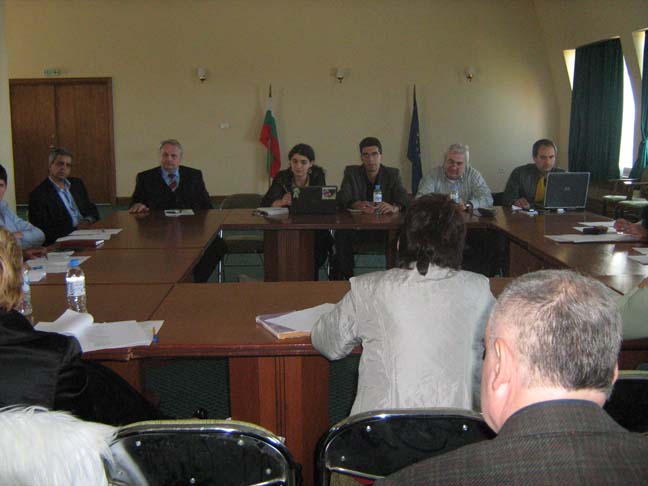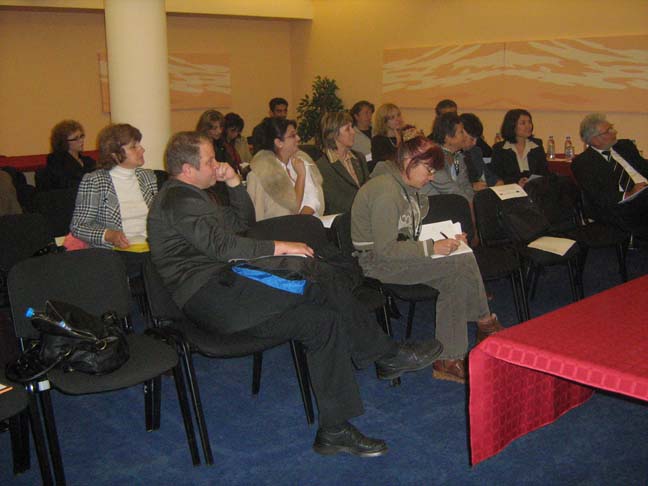15.10.2008Regional discussions about the Framework Program for Roma Integration: facts and analysis
 The facts: Regional discussions about the main principles and statements of the Framework Program for Roma Integration were organized in the six regions of Bulgaria from October 6 and 11 as follow: October 6 – Stara Zagora, October 7 – Plovdiv, October 8 – Sofia, October 9 – Montana, October 10 – Veliko Turnovo and October 11 – Razgrad. They were organized by Ethnic and Demographic Issues Directorate after a request of Roma NGOs and the Deputy Chair of the National Council for Cooperation on Ethnic and Demographic Issues Deyan Kolev. The expenses for discussion organization were covered by SISI Dominus Consortium.
The facts: Regional discussions about the main principles and statements of the Framework Program for Roma Integration were organized in the six regions of Bulgaria from October 6 and 11 as follow: October 6 – Stara Zagora, October 7 – Plovdiv, October 8 – Sofia, October 9 – Montana, October 10 – Veliko Turnovo and October 11 – Razgrad. They were organized by Ethnic and Demographic Issues Directorate after a request of Roma NGOs and the Deputy Chair of the National Council for Cooperation on Ethnic and Demographic Issues Deyan Kolev. The expenses for discussion organization were covered by SISI Dominus Consortium.
Around 200 people took part in the discussions – representatives of district/municipal administrations and Roma NGOs. Their number and proportion varied in the regions. The meetings in Stara Zagora, Plovdiv and Sofia were small: not more than 20 people attended every of them (for example – 21 in Stara Zagora, 19 in Plovdiv) and most of the participants were public officials. The Roma NGOs were almost missing in these meetings and the discussions themselves were relatively weak. Twice more people attended the discussions in Montana, Veliko Turnovo and Razgrad; the debates were intensive and overdraw the main visions about the basic issues from the Program. The discussions were moderated by Rumyan Sechkov and Teodora Krumova. Deyan Kolev (Deputy Chair of NCCEDI), Georgi Krastev (Head of Roma Integration Branch of Ethnic and Demographic Issues Department) and Ahmed Ahmed (expert from Roma Integration Branch) did the main presentations.
Certain common ideas were supported by all participants: both NGO and public administration representatives:
- the present Framework Program for Equal Integration of Roma in Bulgarian Society (approved in April 1999) sets good principles and statements but they were not applied during the past 10 years. It is necessary to re-confirm and extend these principles and that is why updated Program instead of new Program is necessary. The updated Program should continue the principles set up by FPEIRBS from 1999 within the new conditions in which Bulgarian society is situated (especially after EU accession) and should extend them with mechanisms for financing, participation of municipalities and NGOs as well as administrative responsibilities;
- the Framework Program should convert into National Program: i.e. program with concrete activities, financing, terms and responsibilities;
- decentralized approach of implementation is necessary: the municipalities should become the main driving force and should receive financial resources for implementation of their Municipal plans for Roma integration. At the same time special mechanisms for control and sanctions of municipalities that deny undertaking actions for Roma integration are necessary;
- financing from the State budget will be crucial for Program implementation: the existing practice to not dedicate special financing for Framework program implementation proved to be inefficient. The state budget financing should start from Budget 2009 and should be complemented with EU structural funds financing;
- the updated Program should be approved with Decision of the Parliament.
Serious discussions without achieving common decision accompanied the following issues:
- many participants advocated for establishing State Agency or Ministry for integration of Roma. The others expressed doubts of the efficiency of such a step. Converting Ethnic and Demographic Issues Directorate into State Agency and assigning more officials could even make the integration process more clumsy and complicated. Decentralizing and delegating responsibilities to municipalities and NGOs is more efficient and effective approach;
- many participants expressed fairs that the process of updating the Framework program could be politicized, the good suggestions prepared until now would be completely denied because of political reasons and finally the Council of Ministers would vote completely different Program. Answering these fairs, Deyan Kolev called all Roma NGOs to agree with consensus on all important suggestions, to propose concrete texts for all these suggestions and to suspend the entire process in case Roma suggestions are denied by the Council of Ministers. “If our suggestions are replaced and completely new document is prepared, we should distinguish ourselves from the process and to leave the NCCEDI – all together” – underlined Kolev.
 Analysis:
Analysis:
The technical organization of the discussion by the side of Ethnic and Demographic Issues Directorate had serious defects. Although the decision for organizing regional discussions was taken in the beginning of September – following the request of Roma NGOs and the Deputy Chair of NCCEDI – EDI Directorate stated preparing the discussions in the last possible moment. As a result, most of Roma NGOs did not learn about the discussions. In addition, EDI Directorate chose a doubtful way of inviting participants: through experts in district administrations were invited only members of the District Councils on ethnic and demographic issues. In this way most of Roma NGOs and CBOs were not invited since they were not members of these Councils. All these determined the low level of attendance – especially during the first 3 days: many organizations did not attend the discussions because they did not learn about them. For example, not more than 4 Roma NGOs attended the meeting in Plovdiv; slightly more they were in Sofia and Stara Zagora but even there they were significantly less than the number of working Roma NGOs. Only in Montana, Veliko Turnovo and Razgrad a relatively huge number of Roma NGOs attended the meetings owing to the engagement of Roma organizations to assist organizing the events (Integro in Razgrad, Amalipe in Veliko Turnovo and Roma-Lom in Montana): otherwise they would have the same attendance as the other meetings. The defects in the technical organizations put under doubts the very idea for regional discussions in Stara Zagora, Plovdiv and Sofia: instead of broad discussions with high attendance of NGOs and Roma community they became small meetings attended mainly by officials. In these regions the aching problems connected with the preparation of an updated Program were not spelled out and the very idea of preparing an updated Program was put under doubt because most of Roma NGOs felt they were excluded from the process deliberately and the Program is prepared by few officials who follow a political commission.
The discussions revealed clearly the low political engagement for updating the Framework program. The fact that no financing for Framework Program implementation is included in the draft for Budget 2009 is a strong indicator in this direction. This is an alarming trend that would completely alienate Roma NGOs from the process.
The discussions showed also the lack of consensus among Roma NGOs concerning the preparation of an updated/new Program. Many of them shared their fairs that this important document will be used only for “raising ballots” in the election campaign. According to the others the low level of political commitment for Roma integration will make the document “paper tiger”: a sheet with good content and intentions but with no implementation. Lack of confidence to the will and capacity of politics and institutions for Roma integration activities accompanied with lack of belief that civil society organizations could change something in the situation depict clearly the crisis of ideas among many Roma NGOs. The preparation of an updated Program could be a cause for many of them but the way the regional discussions were organized prevented this opportunity: at least up to now.








